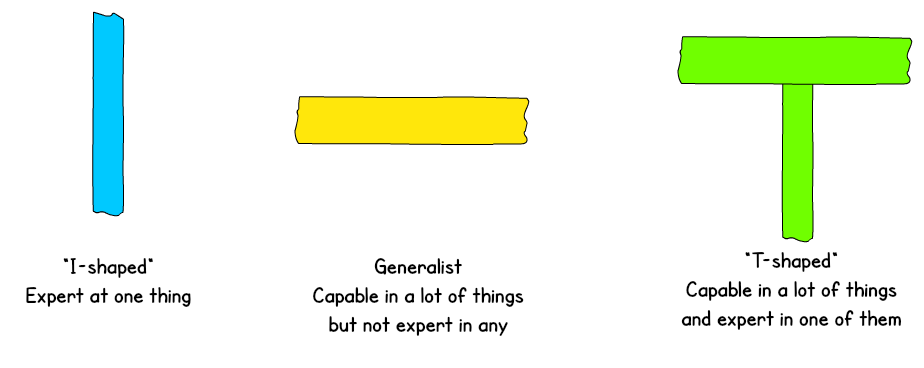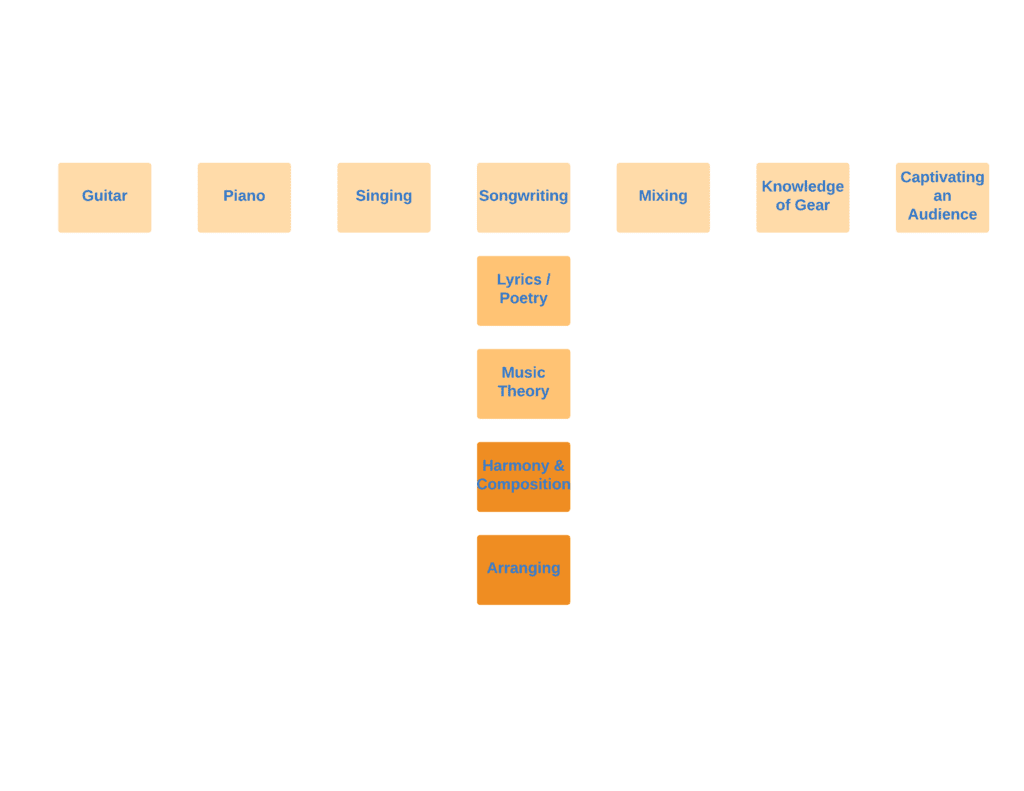Do you ever get the feeling that you’ve spent all your time learning the basis of different skills but had been better of specializing in one thing?
Or the opposite, that you’ve spent all your time focusing and one thing and because of that, lack some other skills that would’ve been useful to have?
A great example of the latter is the artist who has worked years to perfect his or her craft, but never invested time learning about marketing or business. Which blocks them from making enough money off of it to survive.
An example of the former would be the person that gets super excited about every new hobby or project but isn’t passionate enough about one thing to really stick with it and become exceptional.
Generalist or Specialist: Which Is Better?
The answer is hard to say. They both have advantages. But both strategies also have a gaping vulnerability that needs to be addressed.
When you are a jack of all trades, as the proverb says, you’re also a master of none. Which means that for every single thing you do, there are other people who can do it better. That means when someone hires you for one of your skills, to that person you are easily replacable by someone else. Since you are only average at it.
The problem with being a specialist is a more subtle one. You are very good at one thing. Probably better than most people. So in that sense you will most likely not be replaced by someone else unless people stop working with you for other reasons (like you being a duck). However, the risk here is that your profession becomes obsolete. This can be permanent, when automation becomes the new norm in your industry. Or it can also be temporary.
For example: What if your only skill in life is that you are an exceptional bartender? When the country goes in quarantaine to deal with a global pandemic, it will be quite hard for you to find work in which you are irreplacable. There will be jobs. But your personal job security will be a lot lower. As you will be competing for the function with every other average Joe.
Interestingly, the solution to both of these problems is the same thing.
Developing a T-Shaped Skillset
The solution lies in something called a “T-shaped” skillset. Which makes you neither a generalist, nor a specialist.
This is something I have always done throughout my life without knowing. But this week I saw the concept articulated in a Facebook group for the first time and struck such a chord with me that I wanted to share it with you.
So what’s a T-shape skillset? This picture explains it better than I could do with words:

As a musician for example. I have a clear T-shaped skillset. I am only average at many things musicians do (better than most amateurs but worse than most semi-professionals). But I’ve spent over half a decade writing 100+ songs a year, analyzing what worked and what didn’t work in them. Studying what I liked or disliked in other’s songs. And the years before that I learned music theory, studied composition and wrote lyrics every day. As a result, my skillset looks a bit like this:

If you look at my other most important skillset, the one I use to earn the bulk of my money with, it looks very similar:

I could make a scheme for blogging or coaching or anything else that I do for work, and the results would likely be the same.
If you haven’t mapped out your own skillset yet, I invite you to give it a shot. Seeing it visualized like this is important because it shows you were your competitive edge is.
If you are in my situation and you already have a t-shaped skillset, it shows you which area to double down your effort on.
For example, I could invest all my energy in becoming a better guitarist, vocalist or in expanding my gear knowledge. And while valuable from a personal growth standpoint, it would not be very helpful as an asset. Because in the end I’d still be an average guitarist compared to the already oversaturated market of other guitarists. It wouldn’t make people want to hire me as their main guitarist all of a sudden.
That doesn’t mean I shouldn’t invest any time in it. Of course I should continue to work on every part of my musician skillset, or I’ll become a generalist who only knows how to write songs. But the bulk of my effort should be spent on continuing to deepen my knowledge of songwriting. This makes me more indispensable as a musician in general.
Just the same, as a marketer, it doesn’t pay to focus all my energy on analytics or design. The creative aspects are much harder to learn for most people, and they are what I am best it. So 80% of my efforts go to becoming even better at that, while 20% goes to improving my “general knowledge”.
If you are currently a specialist with an I-shaped skillset, ask yourself: What are some adjacent areas that you can get better in to broaden the top of your t? Things that will improve the value of your craft as a whole. For example
• As a yoga teacher you may want to expand your knowledge of anatomy, philosophy, mediation, massage, strength training or even body building.
• If you are a carpenter you may want to learn about wood carving too, etc.
• If you are programmer you may want to learn different languages, learn about cyber security, hardware, hacking or other IT-related issues.
I can’t speak that much about professions that I have no experience with myself, as my knowledge of them is not very deep. But when you ponder this idea, I’m sure will have a hunch of which things you can learn more about.
If you are currently more a jack of all trades, then what can you do to lengthen the bottom of your t?
Find out which of your general skills you have a natural inclination for. Something you occasionally get compliments on, easily find work in, or simply enjoy doing a lot. Now take some of the time you spend on learning new random skills, or on skills that don’t provide you much leverage, and dedicate that time about deepening the knowledge of that specific skills.
What are some aspects you don’t know anything about yet? What weakness in that area can you get better at? What strengths can you capitalize on? How much time do you consciously practice this skill?
If you spend just one year going really deep in it, you will already be more proficient in it than most people. Now what would happen if you dedicated, 2 3 or even 5 years to this skill?
Extending the Idea
You can also apply this idea to other areas of your life that have nothing to do with skills. In the sense that the top of the t is the breadth of anything you do. The bottom of the t is the depth.
Breadth in relationships means knowing many people. Depth in relationships would mean having a very solid connection with just one person.
The downside of breadth is that you don’t really have a strong friendship with anyone. The downside of just depth is that you are at the mercy of 1 person to fulfill your need for social contact, which is usually not a good situation. The solution is having a t-shaped social circle: Being on good terms with many people, but going deeper with specific ones.
In finances, t-shaped investing would mean having a diversified portfolio but also doubling down on a few investments you consider very strong.
My diet consists of eating a lot of the things that feel best for my body and eating them consistently every day. This is depth. But in the breadth, my diet is also very varied. Because one meal a day (dinner) is literally different every day. My girlfriend and I do have some meals that we repeat because we like them. But every time we do, we are amazed at how long it’s been since we ate the same thing twice in a month. If I would not have this variation, I would probably lack some essential nutrients. But if I only ate varied, then I would not be profiting from giving my body the fuel it runs best on every single day.
I invite you to ponder how you can make other areas of your life more t-shaped?
Not Comparing Apples to Oranges
I final tip I’d like to give you is to not judge yourself by the wrong shape. Don’t get your self-esteem tied up into one of the skills on the top of your T.
I could sit here and feel unconfident about the fact that I’m only an average pianist or don’t have a lot of photoshop skills. But instead, I’d rather pat myself on the back for having some creative skills in the area of creative writing that few people I know do as well as me. Or at the very least accept my strengths and weaknesses 😉
You don’t have to be the best at everything to join a project. That’s the whole point of working together with people. Everybody has something different to bring to the table. Just make sure you know what it is that YOU have to bring. What you are good at and what not.
Then give the others the space to bring their thing. And witness the magic of working together as a team, being greater than the sum of its parts 🙂